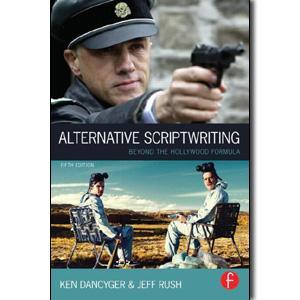Alternative Scriptwriting: Beyond the Hollywood Formula [...]
About
Unlike other screenwriting books, this unique guide pushes you to challenge yourself and break free of tired, formulaic writing--bending or breaking the rules of storytelling as we know them...
--
Ken Dancyger, Tisch School of the Arts, New York University, NY, USA and Jeff Rush, Temple University, Philadelphia, PA, USA.
Market: Beginning and professional filmmakers/writers; students of screenwriting, especially in graduate courses Learn the rules of scriptwriting, and then how to successfully break them! Unlike other screenwriting books, this unique guide pushes you to challenge yourself and break free of tired, formulaic writing--bending or breaking the rules of storytelling as we know them. Like the best-selling previous editions, seasoned authors Dancyger and Rush explore alternative approaches to the traditional three-act story structure, going beyond teaching you "how to tell a story" by teaching you how to write against conventional formulas to produce original, exciting material.
- Beyond the Rules
STRUCTURE
- Structure
- Critique or Restorative. Three-Act Form
- Counter Structure
- More Thoughts on Three Acts: 15 Years Later
- Narrative and Anti-Narrative: The case of the two Stevens: The Work of Steven Spielberg and Steven Soderbergh
- Multiple Thread Long Form Televisoin Serial Scripts
GENRE
- Why Genre? (New chapter)
- Working with Genre I
- Working with Genre II: The Melodrama and the Thriller
- Working Against Genre
- The Flexibility of Genre )New chapter)
- Genres of Voice
- The Non-Linear Film
- The Fable: A case study of Darkness: The Wizard of Oz and Pan’s Labyrinth (New chapter)
CHARACTER
- Reframing the Active/Passive Character Distinction
- Stretching the Limits of Character Identification
- Main and Secondary Characters
- Subtext, Action and Character
- The Primacy of Character over Action: The Non-American Screenplay.
FORM, TONE AND THEORY
- The Subtleties and Implications of Screenplay Form
- Agency and the Other
- Character, History and Politics
- Tone: The Inescapability of Irony
- Dramatic Voice, Narrative Voice
- Digital Features
- Writing the Narrative Voice
- Rewriting
- Adaptations from Contemporary Literature
CONCLUSION
- Personal Screenwriting: The Edge
- Personal Screenwriting" Beyond the Edge.
- Short Description: Alternative Scriptwriting: Beyond the Hollywood Formula, 5th Edition
- Website URL: https://studentfilmmakersstore.com/collections/screenwriting/products/alternative-scriptwriting-5th-edition
-
Anong Lawan and Marianna Schmidt like this
